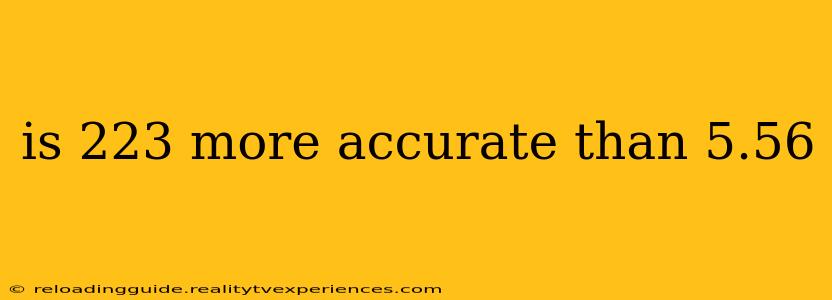Is .223 More Accurate Than 5.56? Understanding Cartridge Differences and Accuracy
The question of whether .223 Remington is more accurate than 5.56x45mm NATO is a complex one, and the simple answer is: it depends. While both cartridges are very similar, subtle differences in their design and specifications can impact accuracy, particularly at longer ranges. Let's delve into the details.
The Subtle Differences Between .223 and 5.56
The .223 Remington and 5.56x45mm NATO cartridges are often used interchangeably, leading to confusion. However, key distinctions exist:
-
Chamber Pressure: The .223 Remington operates at lower chamber pressures than the 5.56 NATO round. This lower pressure is generally considered safer in civilian firearms.
-
Chamber Dimensions: While seemingly minor, differences in chamber dimensions exist. A .223 Remington chamber is slightly smaller, meaning a 5.56 NATO round can sometimes be fired from a .223 chamber (but not always recommended). Conversely, firing a .223 Remington round from a 5.56 chamber is generally considered safe.
-
Bullet Construction & Velocity: The variations in chamber pressure and dimensions can affect bullet velocities and the consistency of those velocities. These variations, however slight, can impact accuracy.
Accuracy: A Multifaceted Factor
Accuracy isn't solely determined by the cartridge itself. Several other factors heavily influence the precision of a shot:
-
Rifle Quality: The rifle's barrel, action, and overall construction play a crucial role. A high-quality, well-maintained rifle will generally produce superior accuracy regardless of the cartridge used.
-
Ammunition Quality: The quality of the ammunition, including bullet consistency, powder charge, and primer quality, significantly impacts accuracy. Higher-quality ammunition tends to yield better results.
-
Shooter Skill: The shooter's skill level, including proper stance, sight alignment, trigger control, and breathing technique, significantly affects accuracy. A skilled shooter can compensate for minor cartridge variations.
-
Range and Environmental Conditions: Wind, temperature, and humidity can all influence projectile trajectory and accuracy, particularly at longer distances.
So, Which is More Accurate?
In ideal conditions, with a high-quality rifle and premium ammunition, the difference in accuracy between .223 Remington and 5.56x45mm NATO is often negligible at shorter ranges. However, at longer distances, the slightly higher chamber pressure and potential for variation in 5.56 ammunition may lead to slightly reduced accuracy compared to .223 Remington, particularly in rifles specifically chambered for .223. This is due to the potential for increased pressure causing inconsistent bullet performance in .223 chambers.
Ultimately, the "more accurate" cartridge is less about the inherent properties of the round and more about the complete system—the rifle, the ammunition, and the shooter's skill. Choose the cartridge that best suits your firearm, your shooting style, and your intended use.
Conclusion: Prioritize the System, Not Just the Cartridge
Focusing solely on the .223 vs. 5.56 debate misses the bigger picture. The accuracy of your shots depends on many factors beyond the cartridge itself. Instead of fixating on this single aspect, concentrate on optimizing the entire system for better performance. Invest in a quality rifle, high-quality ammunition, and practice regularly to achieve the best accuracy possible.

